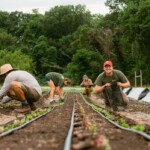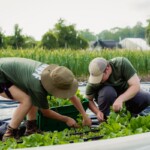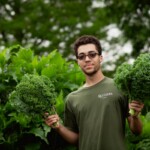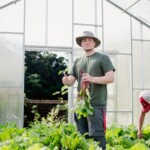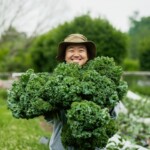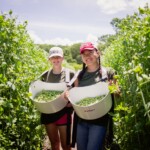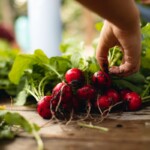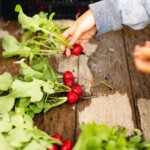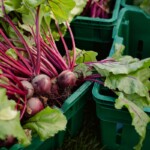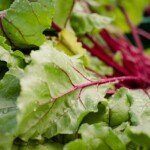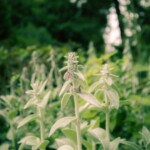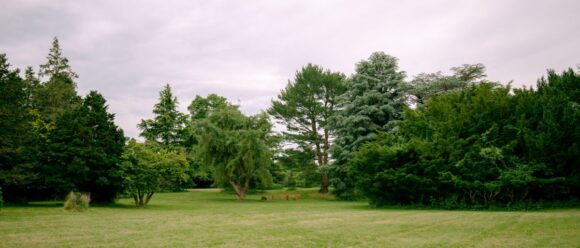
Rutgers Gardens. Photo: Francis Cameron.
By Francis C. Blackman (SEBS’24)
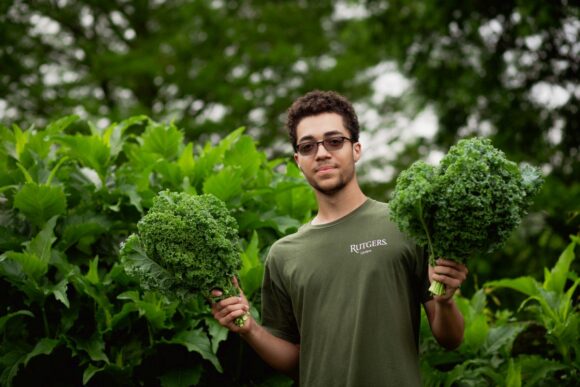
Francis Cameron with harvested bunches of Kale for Cook’s Market at the Student Farm, Rutgers Gardens. Photo: Timothy Roden.
As an undergraduate student in the Environmental Policy Institutions and Behavior (EPIB) major program here at Rutgers, I had the opportunity to participate in the Rutgers Gardens Student Farm Internship this summer. When applying, it seemed like the Student Farm could offer a fulfilling setting to expand my knowledge of how people interact with the environment. It has exceeded my expectations. I work with a great group of colleagues who are driven to learn about agriculture and provide affordable organic food to the surrounding community.
We tend to about an acre of vegetables such as snap peas, cucumbers, potatoes, and more. We seed, plant, weed, prune, fertilize, and compost. Our team’s efforts yield fresh produce made available for sale at Cook’s Market every Friday, and for delivery to the Rutgers Student Food Pantry, which helps food insecure students access fresh vegetables. Our goal at the Student Farm is to produce nutrient-dense crops in a way that is ecologically sound, socially just, and financially viable—the three pillars of sustainability.
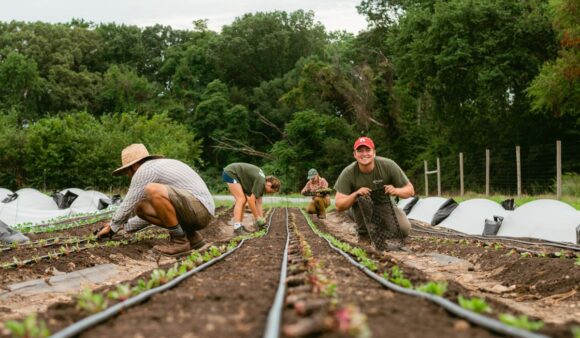
Student Farm Team planting 3 beds of beets on a cloudy afternoon. From left to right: Student Farm manager Alex Sawatzky, field team leader Rachel Rapach, and student interns Sarah McMenamin and Timothy Roden. Photo: Francis Cameron.
In the nearly three months I have been interning at the Student Farm, I have learned to appreciate the work that goes into farming, especially how sustainable farming positively impacts the environment and the surrounding community. Although some aspects of the internship can be challenging—when the weather starts to get unusually hot and you are wheel barrowing large amounts of compost—it is a very rewarding experience overall. Seeing people’s happy faces as they choose our freshly harvested vegetables from the market stand is a sight enjoyed by all who work at the Student Farm.

Bamboo Forest at Rutgers Gardens. Photo: Francis Cameron.
The Student Farm is only one part of the beautiful Rutgers Gardens. The 180-acre site also includes curated garden spaces, plant collections, hiking trails, a bamboo forest, and other green spaces that together make up the official botanic garden of Rutgers University. As Rutgers Gardens has been emerging from the pandemic, it has entered a period of rebuilding and new growth. Over the coming year, the Rutgers Gardens team is looking forward to creating more fun and educational opportunities to engage the community and will be increasing both the staff and volunteer base to support the budding programs.
Looking to the future, Lauren Errickson, director of Rutgers Gardens, will lead the creation of, “a comprehensive strategic plan to guide the development of our programs, fundraising efforts, and garden projects.” Errickson has indicated that the Gardens will be expanding its ecological focus by adding more varieties of native plants and incorporating them into educational programs on site.

Rutgers Gardens. Photo: Francis Cameron.
Another goal of the Gardens is to improve the well-being of the surrounding community by giving access to green space, gardens, and healthy food grown on site. The Gardens is excited to realize this goal through the much-appreciated help of community and university partnerships. As a start, Cook’s Market recently announced its acceptance and doubling of SNAP benefits to help customers who receive these benefits access more local foods, and increase the customer base through more affordable prices. The Rutgers Gardens Student Farm is one of the Cook’s Market vendors that sells SNAP-eligible products, so accepting SNAP is also increasing the impact of the Student Farm interns who grow the food.
I am a cog in the machine that is Rutgers Gardens. A “green machine” that works to offer a special place for anyone who chooses to come, no matter who they are. A place to breathe, hike, relax, marry the one you love, or simply have a picnic and enjoy the scenery. I came to Rutgers Gardens with a mission of growing fresh food, and it has vastly expanded my appreciation for nature, agriculture, and the environment as a whole. I look forward to taking the hands-on knowledge I have learned about food systems and food delivery and using it to frame my learning and maybe even the decisions I make in my future career.
